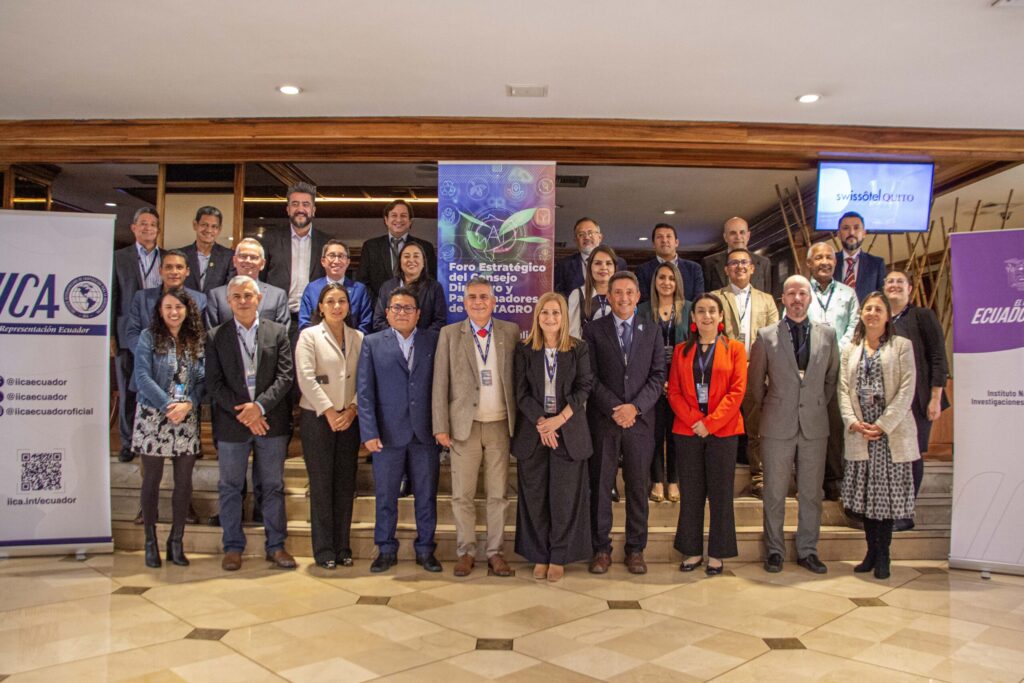
The Strategic Forum of the Board of Directors and Sponsors of FONTAGRO: “Innovation and Sustainability in Agriculture: Modernization and Financing Strategies for LAC” was successfully held from July 9th to 12th in Quito, Ecuador. Leaders and researchers from national technological institutes in Latin America and the Caribbean, along with academics from important international institutes and universities, gathered to analyze fundamental challenges and opportunities in agri-food innovation, including technological transformation, sustainability, and climate change adaptation. They also discussed new financing models to promote food security and sustainable production in the region.
This event, led by FONTAGRO with support from the Inter-American Development Bank, the Inter-American Institute for Cooperation on Agriculture (IICA), The World Bank, FAO, and the National Institute of Agricultural Research (INIAP-Ecuador), featured renowned international leaders and influential institutional directors, and provided a space for reflection and debate on the following critical topics:
Challenges and Opportunities in Agri-food Innovation
– New innovation patterns and emerging challenges for Science and Technology (S&T) systems in agriculture were explored, focusing on the need to adapt to a constantly evolving technological environment.
Financing and Collaboration Strategies
– Key strategies to drive the modernization of Agricultural Research and Development (R&D) in the region were discussed in depth, including trends in financing, collaboration, and relationships with National Agricultural Research Institutes (INIAs) in Latin America and the Caribbean.
Strengthening the Future of Agricultural Innovation
– FONTAGRO’s fundamental role in modernizing R&D+I systems was highlighted, along with specific cases of innovation and technology in various countries, emphasizing the importance of promoting research and development in the agri-food sector.
Adaptation and Resilience in Agriculture
– The effects of climate change on food security, trade, and migration were analyzed, underscoring the urgent need to implement mitigation and adaptation strategies to ensure the sustainability of the agricultural sector.
Challenges and Investments in Agricultural Research
– The challenges of Agricultural Research and Development were addressed, as well as global trends in agricultural R&D investment, highlighting the need to promote sustainability and innovation to face future challenges.
Innovation and Technology in Food Systems
– The potential of innovation and technology to transform agri-food systems, from production to consumption, was explored, focusing on sustainability, efficiency, and food security.
This Forum has been an enriching space for exchanging ideas, identifying priorities, and promoting concrete actions for moving towards more sustainable and resilient agriculture in Latin America and the Caribbean.
For more details on the topics addressed at the Strategic Forum of the Board of Directors and Sponsors of FONTAGRO: “Innovation and Sustainability in Agriculture: Modernization and Financing Strategies for LAC,” visit:
https://digital.fontagro.org/en/strategic-forum-of-the-board-of-directors-and-sponsors/
***
About FONTAGRO
FONTAGRO was created 1998 with the purpose of promoting the increase of the competitiveness of the agri-food sector, ensuring the sustainable management of natural resources and the reduction of poverty in the region. The objective of FONTAGRO is to establish itself as a sustainable financing mechanism for the development of agricultural technology and innovation in Latin America and the Caribbean and Spain, and to establish a forum for the discussion of priority topics of technological innovation. The member countries are: Argentina, Bolivia, Chile, Colombia, Costa Rica, Ecuador, Spain, Honduras, Nicaragua, Panama, Paraguay, Peru, Dominican Republic, Uruguay and Venezuela. In the last 27 years 204 regional agricultural innovation platforms have been co-financed for an amount of US $ 150.7 million, which has reached 531 institutions and 35 countries worldwide.
